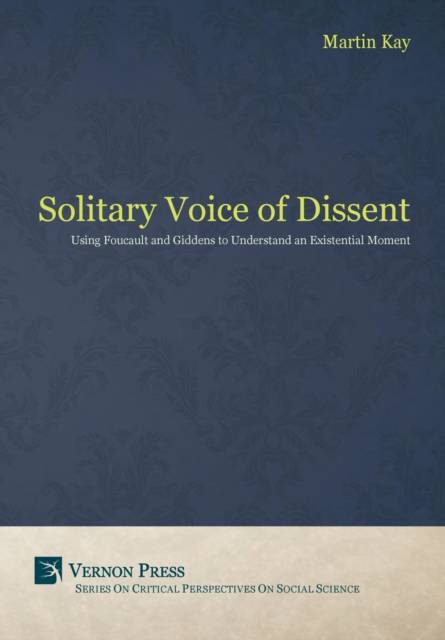
- Afhalen na 1 uur in een winkel met voorraad
- Gratis thuislevering in België vanaf € 30
- Ruim aanbod met 7 miljoen producten
- Afhalen na 1 uur in een winkel met voorraad
- Gratis thuislevering in België vanaf € 30
- Ruim aanbod met 7 miljoen producten
Zoeken
The Solitary Voice of Dissent
Using Foucault and Giddens to Understand an Existential Moment
Kay Martin
€ 46,45
+ 92 punten
Uitvoering
Omschrijving
This book urges respect for solitary dissent rather than censure. It equips a wide audience to understand what previously seemed unimaginable, much less comprehensible. It shows the reader how to reach beyond those first conclusions and into the heart of the matter. The lone voice explains that something has been hidden away, something which the individual now dissenting can no longer acquiesce in. It raises the possibility that more may be seriously wrong. Those who need to understand range from academics, to researchers, to managers, to elected representatives, to journalists. We all have an interest in knowing not just what has gone wrong but also why this person, and no other, decided they could take no more. If we are to correct a bad situation, rather than just patch it up, we need clarity at every level of the individual's deepening unease. The book uses three case studies (two in Ireland and one in UK, and all on the record), to demonstrate an approach to analyzing solitary dissent. The methods used are academic but, in the way they are presented, certainly intelligible to the lay-reader. Indeed, the author (who is one of the case studies) writes with a degree of affection for his two authorities, Michel Foucault and Anthony Giddens, which is engaging, anything but formal, but no less authoritative for that. The Solitary Voice of Dissent is limited by the extent to which the author has been able to delve into the personal privacy of the case studies offered. While each was male, the author also identifies certain contemporary female dissenters. This is an area increasingly impacting upon the public's awareness but which no-one has written about before. If we are to mend our society, we need to start a conversation. A wide audience will wish to follow it.
Specificaties
Betrokkenen
- Auteur(s):
- Uitgeverij:
Inhoud
- Aantal bladzijden:
- 138
- Taal:
- Engels
- Reeks:
Eigenschappen
- Productcode (EAN):
- 9781622734726
- Verschijningsdatum:
- 4/04/2016
- Uitvoering:
- Hardcover
- Formaat:
- Genaaid
- Afmetingen:
- 152 mm x 229 mm
- Gewicht:
- 340 g

Alleen bij Standaard Boekhandel
+ 92 punten op je klantenkaart van Standaard Boekhandel
Beoordelingen
We publiceren alleen reviews die voldoen aan de voorwaarden voor reviews. Bekijk onze voorwaarden voor reviews.











